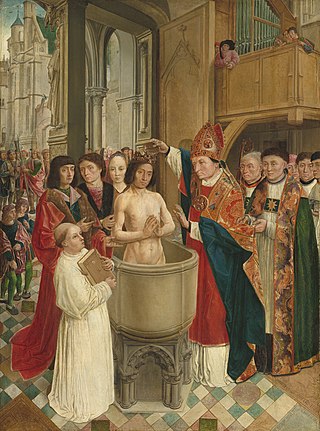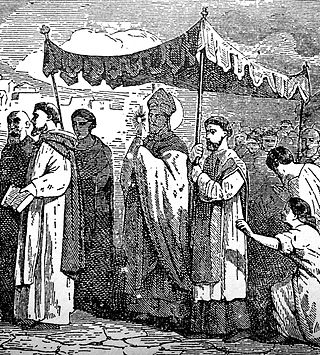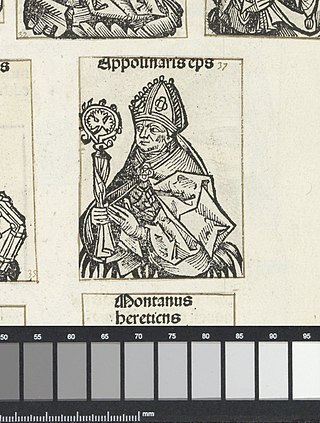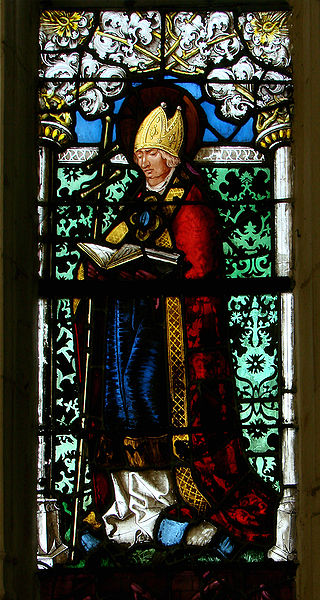Related Research Articles

Gaius Sollius Modestus Apollinaris Sidonius, better known as Sidonius Apollinaris, was a poet, diplomat, and bishop. Born into the Gallo-Roman aristocracy, he was son-in-law to Emperor Avitus and was appointed Urban prefect of Rome by Emperor Anthemius in 468. In 469 he was appointed Bishop of Clermont and he led the defence of the city from Euric, King of the Visigoths, from 473 to 475. He retained his position as bishop after the city's conquest, until his death in the 480s. He is venerated as a saint in the Catholic church, the Orthodox Church, and the True Orthodox Church, with his feast day on 21 August.
Athenagoras was a Father of the Church, an Ante-Nicene Christian apologist who lived during the second half of the 2nd century of whom little is known for certain, besides that he was Athenian, a philosopher, and a convert to Christianity.

Alcimus EcdiciusAvitus was a Latin poet and bishop of Vienne in Gaul. His fame rests in part on his poetry, but also on the role he played as secretary for the Burgundian kings.

Diodore of Tarsus was a Christian bishop, a monastic reformer, and a theologian. A strong supporter of the orthodoxy of Nicaea, Diodore played a pivotal role in the Council of Constantinople and opposed the anti-Christian policies of Julian the Apostate. Diodore founded one of the most influential centers of Christian thought in the early church, and many of his students became notable theologians in their own right.

Remigius was the Bishop of Reims and "Apostle of the Franks". On 25 December 496, he baptised Clovis I, King of the Franks. The baptism, leading to about 3000 additional converts, was an important event in the Christianization of the Franks. Because of Clovis's efforts, a large number of churches were established in the formerly pagan lands of the Frankish empire, establishing a distinctly Orthodox variety of Christianity for the first time in Germanic lands, most of whom had been converted to Arian Christianity.

Mamertus was the bishop of Vienne in Gaul, venerated as a saint. His primary contribution to ecclesiastical practice was the introduction of litanies prior to Ascension Day as an intercession against earthquakes and other disasters, leading to "Rogation Days." His feast day is the first of the Ice Saints.

Saint Apollinaris Claudius, otherwise Apollinaris of Hierapolis or Apollinaris the Apologist, was a Christian leader and writer of the 2nd century.

Apollinaris of Ravenna is a Syrian saint, whom the Roman Martyrology describes as "a bishop who, according to tradition, while spreading among the nations the unsearchable riches of Christ, led his flock as a good shepherd and honoured the Church of Classis near Ravenna by a glorious martyrdom."

Eucherius was a high-born and high-ranking ecclesiastic in the Christian church in Roman Gaul. He is remembered for his letters advocating extreme self-abnegation. From 439, he served as Archbishop of Lyon, and Henry Wace ranked him "the most distinguished occupant of that see" after Irenaeus. He is venerated as a saint within the Eastern Orthodox Church and the Roman Catholic Church.
Apollinaris may refer to:
Saint Apollinaris of Valence (453–520), born in Vienne, France, was bishop of Valence, France, at the time of the irruption of the barbarians. Valence, which was the central see of the recently founded Kingdom of the Burgundians, had been scandalized by the dissolute Bishop Maximus, and the see in consequence had been vacant for fifty years.

Perpetuus was the sixth Bishop of Tours, serving from 460 to 490.

Faustus of Riez was an early Bishop of Riez (Rhegium) in Southern Gaul (Provence), the best known and most distinguished defender of so-called Semipelagianism.
The Archbishopric of Vienne, named after its episcopal seat in Vienne in the Isère département of southern France, was a metropolitan Roman Catholic archdiocese. It is now part of the Archdiocese of Lyon.

The former French Catholic diocese of Riez existed at least from fifth century Gaul to the French Revolution. Its see was at Riez, in the modern department of Alpes-de-Haute-Provence.
Saint Viventiolus was the Archbishop of Lyon 514–523. Later canonized and venerated as a saint within the Catholic Church, Archdiocese of Lyon, France his feast Day is July 12. He is recognised in the Orthodox Church and the True Orthodox Church, including amongst the Tikhonites, as a pre-Great Schism Western Saint.
Saint Rusticus, the successor of Saint Lupicinus of Lyon (491-494), served as Archbishop of Lyon from 494 to April 501. Later canonized and venerated in the Catholic Church, his feast day is 25 April.

Saint Claudius of Besançon, sometimes called Claude the Thaumaturge, was a priest, monk, abbot, and bishop. A native of Franche-Comté, Claudius became a priest at Besançon and later a monk. Georges Goyau in the Catholic Encyclopedia wrote that “The Life of St. Claudius, Abbot of Condat, has been the subject of much controversy.” Anglican Henry Wace claimed that "on this saint the inventors of legends have compiled a vast farrago of improbabilities."
Auspicius of Toul was a 5th-century bishop of Toul, the fifth of those recorded, and a saint of the Roman Catholic church. He was also a poet, known for iambic verse based on stress ; this was an innovation of his time. A verse letter of his from around 470 to Arbogast, count of Trier, survives.

Apollinaris was a Count of Auvergne who led a auvergnat army for the Visigoths in the Battle of Vouillé, and was bishop of Clermont for four months before his death.
References
- ↑ "Psalmorum hic modulator et phonascus ante altaria fratre gratulante instructas docuit sonare classes" (Epist., IV, xi, 6; V, 13-15).
- ↑ "Claudianus Mamertus", The Concise Oxford Dictionary of the Christian Church 2 rev. ed., ( E. A. Livingstone, ed.) 2013 ISBN 9780198614425
- 1 2 3 Lejay, Paul. "Claudianus Mamertus." The Catholic Encyclopedia Vol. 4. New York: Robert Appleton Company, 1908. 4 November 2021
 This article incorporates text from this source, which is in the public domain .
This article incorporates text from this source, which is in the public domain . - ↑ Philip Schaff, Nicene and Post-Nicene Fathers, Second Series: Theodoret, Jerome, Gennadius, Rufinus: Historical Writings (Cosimo, Inc., 1 June 2007), p. 397
![]() This article incorporates text from a publication now in the public domain : Herbermann, Charles, ed. (1913). "Claudianus Mamertus". Catholic Encyclopedia . New York: Robert Appleton Company.
This article incorporates text from a publication now in the public domain : Herbermann, Charles, ed. (1913). "Claudianus Mamertus". Catholic Encyclopedia . New York: Robert Appleton Company.